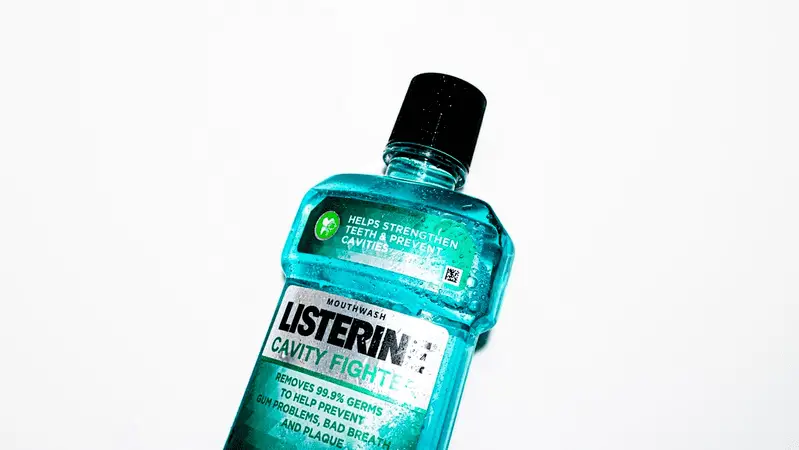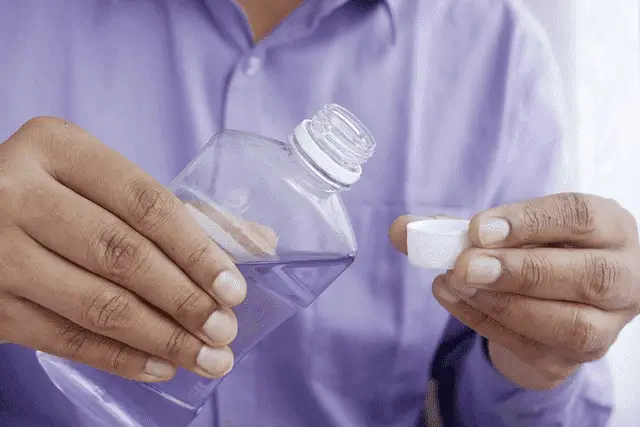Wondering what happens if you swallow mouthwash? Mouthwash is a liquid that is used to clean the teeth and gums. It can also help to remove bacteria and plaque from the mouth. While mouthwash is generally safe to use, there are some risks associated with its use. Swallowing mouthwash can be dangerous and even deadly.
However, what many people may not know is that mouthwash can be dangerous if swallowed.

Mouthwash is one of those products that many people use every day, but may not think about the potential risks involved with its use. Swallowing mouthwash can be dangerous, and in some cases, deadly.
In this blog post, we will discuss the risks of swallowing mouthwash and what happens if you do. We will also provide some tips on how to avoid swallowing mouthwash.
What is mouthwash?
Mouthwash, also known as a mouth rinse or an oral rinse, is a liquid solution that is used to clean the teeth and gums. It helps remove plaque and bacteria from the teeth and gums, and it can also help freshen breath.
There are many different types of mouthwash available, including fluoride mouthwash, antiseptic mouthwash, and herbal mouthwash. Mouthwash can be purchased over-the-counter or through a dentist.
What does a mouthwash contain?
Most mouthwashes contain water, alcohol, and a variety of chemicals. The exact ingredients vary from product to product, but common ingredients include menthol, eucalyptol, methyl salicylate, and thymol. These ingredients work together to kill bacteria, freshen breath, and leave the mouth feeling clean and refreshed.
Mouthwashes are available in a variety of formulations, including gels, liquids, and powders. They can be purchased over-the-counter or prescribed by a dentist or doctor. It is important to follow the directions on the product label when using mouthwash. Most products should be used twice a day, after brushing and flossing.
The mouth should be rinsed with water before using the mouthwash. Mouthwashes should be swished around the mouth for 30 seconds to 1 minute before being spit out. There are a few things to keep in mind when using mouthwash. First, it is important to choose a product that is right for your needs.
If you have sensitive teeth or gums, look for a product that is alcohol-free. Second, avoid eating or drinking for 30 minutes after using a mouthwash, as this can reduce its effectiveness. Finally, remember that mouthwashes are not a substitute for brushing and flossing; they should be used in addition to these activities.
Mouthwashes are a convenient and effective way to keep the mouth clean and refreshed. By following the directions on the product label, you can make sure that you are using the mouthwash correctly. Choose a product that is right for your needs and use it in addition to brushing and flossing for best results.
Is it possible to swallow mouthwash?
The answer to this question is both yes and no. It is possible to swallow mouthwash, but it is not recommended. Mouthwash is designed to be swished around in the mouth, where it can kill bacteria and freshen breath. When swallowed, mouthwash can upset the stomach and cause nausea or vomiting.
In addition, some mouthwashes contain alcohol, which can be dangerous if consumed in large quantities. For these reasons, it is best to spit out mouthwash after use rather than swallow it.
Swallowing mouthwash is not advised, but it is possible. Most mouthwashes contain alcohol, which can be dangerous if consumed in large quantities. Additionally, many drops of mouthwash also contain fluoride, which can lead to vomiting and diarrhea if swallowed. For these reasons, it is best to avoid swallowing mouthwash.
However, if you do accidentally swallow a small amount of mouthwash, there is no need to panic. Most healthy adults can tolerate a small amount of alcohol without any serious consequences. Just be sure to rinse your mouth out with water afterward and contact your doctor if you experience any adverse effects
What happens if you swallow mouthwash?

While mouthwash can be an effective way to freshen your breath and kill harmful bacteria, it is not meant to be swallowed. Most mouthwashes contain alcohol, which can be toxic if ingested in large quantities.
In addition, mouthwashes often contain strong acidic compounds, such as menthol or eucalyptus oil, which can irritate the stomach lining and lead to nausea or vomiting. In rare cases, swallowing mouthwash can also cause convulsions or unconsciousness. For these reasons, it is important to Spit, don’t Swallow!
Most mouthwashes contain alcohol, which can be dangerous if swallowed in large quantities. The alcohol can cause vomiting and dizziness, and it may also lead to difficulty breathing. In extreme cases, swallowing mouthwash can be fatal.
In addition to the alcohol, mouthwashes often contain other chemicals, such as menthol, that can be harmful if ingested. Therefore, it is important to keep mouthwash out of reach of children and to avoid swallowing it yourself. If you do accidentally swallow mouthwash, it is important to seek medical attention immediately.
How does the body reacts if you swallow mouthwash?
The effects of swallowing mouthwash will depend on the specific ingredients, but they can range from mild to severe. In general, the alcohol in mouthwash will cause the most immediate problems. It can lead to vomiting, drowsiness, and respiratory distress.
The essential oils can also cause irritation and swelling in the throat and gastrointestinal tract. Fluoride, meanwhile, is a known toxin that can cause neurological damage if swallowed in large amounts. For these reasons, it is important to be careful when using mouthwash and to avoid swallowing it.
If you’ve ever accidentally swallowed a mouthful of mouthwash, you may have noticed that your mouth feels strange for a few minutes afterward. This is because most mouthwashes contain ingredients that are designed to kill bacteria and other microbes. These ingredients can include alcohol, essential oils, and even bleach.
While they’re effective at killing germs, they can also cause irritation and other side effects if they come into contact with the tissues in your mouth or throat.
In most cases, the effects of swallowing mouthwash are temporary and relatively harmless. However, some people may experience more severe side effects, such as difficulty breathing or swelling of the throat. If you experience any of these symptoms after swallowing mouthwash, it’s important to seek medical attention immediately.
Is swallowing mouthwash life-threatening?
Mouthwash is a common household product that is used to promote oral hygiene. While it is safe to use as directed, swallowing mouthwash can be dangerous. Most mouthwashes contain alcohol, which can cause vomiting, diarrhea, and abdominal pain. In addition, mouthwashes often contain other ingredients that can be harmful if swallowed, such as fluoride and menthol.
In some cases, swallowing mouthwash can even be life-threatening. If you or someone you know has swallowed mouthwash, it is important to seek medical attention immediately.
Anyone who has ever accidentally swallowed mouthwash knows that it is an experience they will never forget. The strong taste and burning sensation can be overwhelming, and it is not uncommon to feel like you are going to vomit.
However, while swallowing mouthwash may not be pleasant, it is generally not considered life-threatening. The main ingredient in mouthwash is alcohol, which is a depressant.
This means that it can cause drowsiness and dizziness, and it can also slow down your heart rate and respiratory system. In large amounts, alcohol can be poisonous, but the amount of alcohol in mouthwash is usually not sufficient to cause serious harm.
Of course, if you ingest a large amount of mouthwash or if you have a pre-existing medical condition, it is always best to seek medical attention. In general, however, swallowing mouthwash is not considered life-threatening.
What to do after swallowing mouthwash?
Swallowing mouthwash is not a cause for alarm. Generally, a small amount of mouthwash is not toxic and will not cause any harm. Symptoms to watch out for include difficulty breathing, abdominal pain, and vomiting. It is also important to contact poison control if the person who swallowed the mouthwash is a child or elderly person as they may be more susceptible to harmful effects.
If you have swallowed mouthwash, it is important to drink plenty of fluids to stay hydrated. You should also avoid eating or drinking anything for at least 30 minutes to give your body time to digest the alcohol.
If you experience any severe symptoms, such as difficulty breathing, you should seek medical attention immediately. Overall, swallowing mouthwash is not a serious event, but it is best to avoid it if possible.
What are some home remedies for swallowing mouthwash?
Home remedies for swallowing mouthwash can vary depending on the severity of the situation. For instance, if a person accidentally swallows a small amount of mouthwash, they may be able to drink plenty of fluids and wait for the mouthwash to work its way out of their system.
However, if a person has ingested a large amount of mouthwash or if they are experiencing symptoms such as difficulty breathing, they may need to seek immediate medical attention.
Some home remedies that may be recommended by a doctor include drinking milk or water, taking an over-the-counter antacid, or rinsing the mouth with a baking soda solution.
In severe cases, hospitalization may be necessary in order to receive intravenous fluids and close monitoring.
Tips to avoid swallowing mouthwash
Mouthwash is a refreshing and effective way to clean your mouth, but it’s important to be careful when using it. Swallowing mouthwash can be dangerous, so it’s important to avoid doing so.
Here are some tips to avoid swallowing mouthwash:
- Use a small amount of mouthwash. Only use enough to swish around in your mouth, and spit it out afterward.
- Don’t drink from the bottle. Mouthwash is not meant to be ingested, so don’t drink it from the bottle.
- Avoid using mouthwash right before bed. If you do use mouthwash before bed, make sure to rinse your mouth out thoroughly with water afterward so that you don’t accidentally swallow any.
Following these tips, you can use mouthwash safely and effectively without having to worry about swallowing it.
Conclusion
So, what should you do if you swallow mouthwash? The good news is that most cases of swallowed mouthwash will only result in a stomachache and maybe some vomiting.
However, if you experience any other symptoms – such as difficulty breathing, chest pain, or swelling – seek medical attention right away. In short: don’t panic, but be aware of the risks associated with swallowing mouthwash and know what to do if something goes wrong.
Additional Contents:
What Happens To Tattoos When You Lose Weight
Do Fingerprints Grow Back If Burnt?
Can a Turtle be Without a Shell?
PPS Or PSS?
How to Unscrew a Stripped Screw



